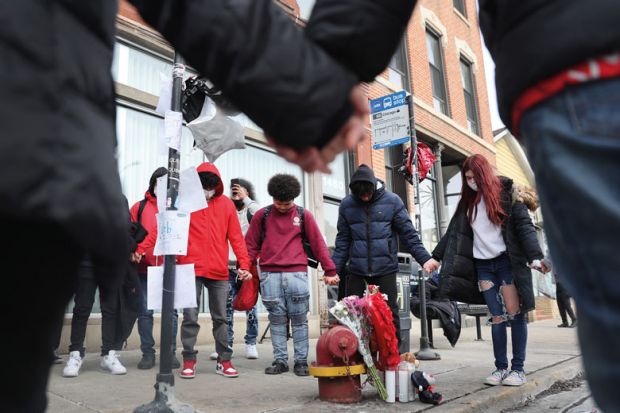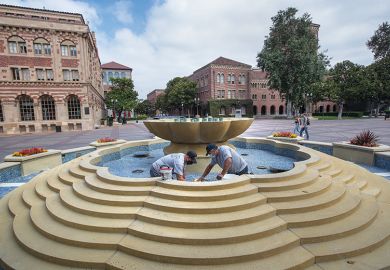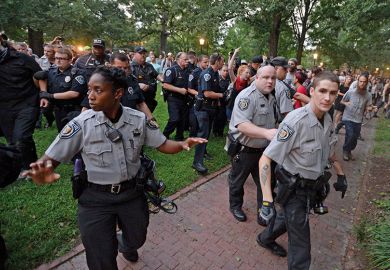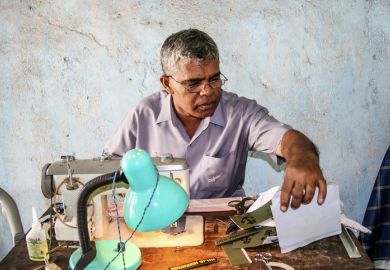Efforts by US universities to cut local crime rates may be backfiring in places, as multimillion-dollar ventures to build researcher ties to police are feared to be supplanting broader solutions with greater community value.
The initiatives include the Crime Lab at the University of Chicago; the Justice Collaboratory and the Center for Policing Equity, both at Yale University; the Criminal Justice Lab at New York University; and numerous other labs, research teams and quasi non-profit organisations at campuses around the country.
Such groups of US faculty and outside partners typically help city governments and their police by compiling and analysing complicated streams of community data to identify anti-crime strategies that promise less harm and greater effectiveness.
Many of the participants describe a core commitment to public service and social equity, with leaders from minority backgrounds who talk of their mission to fight racial bias in the myriad ways it can manifest in both complex computer analytics and split-second police interactions.
A key goal, said leaders of the Center for Policing Equity, was bringing together societal groups that don’t always trust each other, and “making policing less racist, deadly and omnipresent”.
But outside experts are concerned, contending that the data-based policing strategies blossoming in academia are ultimately worsening conditions for low-income minority communities, by emphasising them as hotbeds of criminal activity, bringing them dangerously increased attention from armed governmental forces, and shortcutting more holistic and peaceful solutions to the inequities plaguing them.
“It’s an over-reliance and belief in the premise of crime reduction,” said Davarian Baldwin, a professor of American studies at Trinity College who studies university-community interactions. The result, he said, was minority communities that “are marked, coded and data-collected as criminal”.
Such university-affiliated labs, Professor Baldwin and other critics have warned, too often don’t share their crime-related data publicly or identify who gets access to it in the private sector; become dependent on police support for their continued existence; and receive large amounts of funding from partisan donors who oppose solutions that emphasise economic and social equity, and from companies that benefit from the sales of police surveillance technology.
Professor Baldwin is the author of a book on the ways that universities too often mistreat their local communities, and he regards the proliferation of crime lab-style teams as further examples of cash-strapped institutions embracing wealthy partners and then not looking too hard at whether that compromises their research or missions.
“Because of their partnerships with these police departments,” he said, “it prevents them from having certain conversations, from even asking certain questions about the algorithms that are being imported here.”
The problem with partnering closely with any municipal police agency, said Lester Spence, professor of political science and Africana studies at Johns Hopkins University, was that they were fundamentally “political entities, with an interest in protecting their constituencies and their institutional interest”.
The size of the phenomenon nationwide isn’t fully clear, said Robert Vargas, an associate professor of sociology at the University of Chicago who is in the process of documenting how many such entities exist across the US and exactly what practices they engage in.
Dr Vargas is unambiguous, however, in his assessment that his university’s own Crime Lab – one of the biggest and best known in the country – is not a good model. The Crime Lab, he argues, is aggravating the pain of street violence in Chicago – a city with 3,561 shooting incidents and 797 homicides last year – by encouraging the city’s black mayor and black-led police department to regard youth violence “as a cognitive psychological deficiency in the minds of young black men”.
That, he said, appears to match the political agenda of Ken Griffin, the nation’s largest known Republican donor, who funded the defeat of a progressive income tax ballot measure in Illinois in 2020, has extensive investments in gun and ammunition manufacturers, and has given tens of millions of dollars to the University of Chicago and to its Crime Lab.
Such money, Dr Vargas contended, leads to silence from Crime Lab researchers. “For example, when our mayor in Chicago blames increases on crime on things from lenient judges to arguing for the need for curfew laws for young people, and laws that go after seizing the assets of gang members – all of which there’s long bodies of research showing that these things won’t work – the Crime Lab is interestingly silent on these issues,” he said.
The director and co-founder of the Crime Lab, Jens Ludwig, professor of public policy at the University of Chicago, relayed a request for comment to a media relations aide, who said that nobody from the lab would be available to discuss its operations. The aide instead provided a one-paragraph statement saying that the lab’s work was based on “police reforms recommended by President Obama’s Justice Department”.
Leaders of the Center for Policing Equity also declined to be interviewed. In a written response, the Center said it does publicly share the data associated with its police work, and described some criticisms of its activities as “backlash from retrograde forces”.
POSTSCRIPT:
Print headline: Do campus ‘crime labs’ really help urban poor?
Register to continue
Why register?
- Registration is free and only takes a moment
- Once registered, you can read 3 articles a month
- Sign up for our newsletter
Subscribe
Or subscribe for unlimited access to:
- Unlimited access to news, views, insights & reviews
- Digital editions
- Digital access to THE’s university and college rankings analysis
Already registered or a current subscriber? Login








